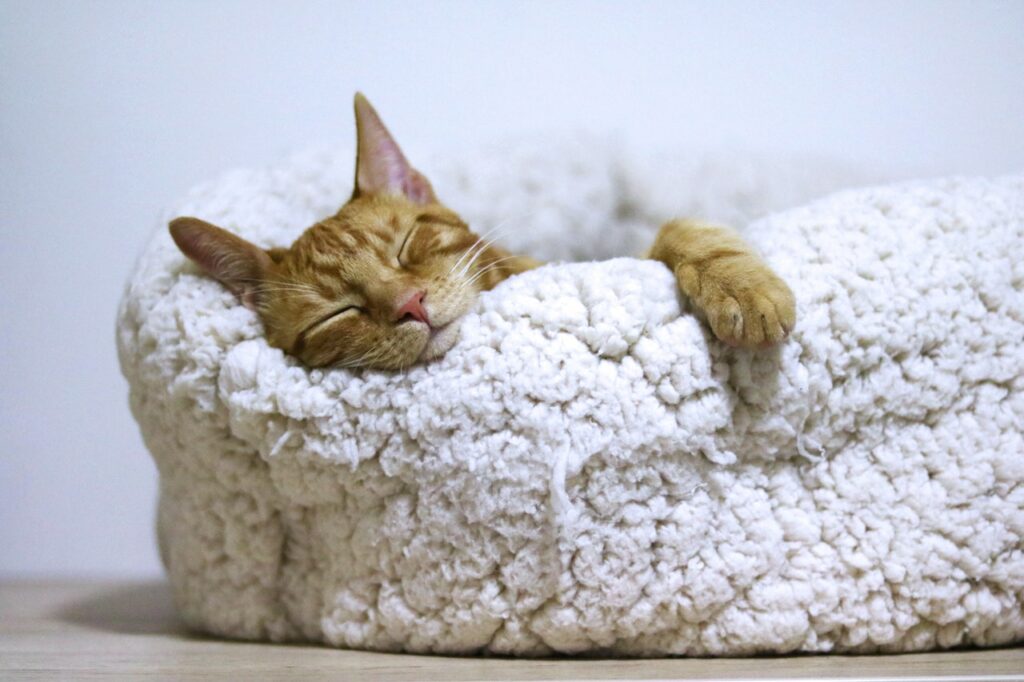Why Does A Cat Snore? Exploring the Causes and Solutions
Do you ever hear your cat snoring while they’re sleeping? You’re not alone! While it may seem strange, cats can make quite a bit of noise while they dream. But why do cats snore, and what causes this behaviour? This article explores why cats snore, its various causes, and how you can help control your cat’s snoring. So if you want to learn more about why your cat is making all that noise in their sleep, read on!
What Causes Snoring in Cats?
When it comes to understanding why cats snore, there are many potential causes. These common factors can range from physical structure or anatomy to health-related issues or behaviour, so it’s important to recognize what might be causing your cat’s snoring.
Here’s a list of some common factors:
- Anatomy – All cats have different facial structures, which can affect their airways and lead to snoring. Cats with flat faces (like Persians) tend to have more narrow nasal passages, which affects airflow and increases the chances of snoring.
- Age – Like humans, as cats age, their airways often narrow due to tissue loss in their throat and nose. This decrease in airflow can lead to frequent snoring.
- Weight – Overweight or obese cats generally have thicker neck muscles which squeeze the airway even more than normal, leading to increased chances of snoring.
- Health Issues – Respiratory diseases such as asthma can limit the air getting into the lungs, causing excessive breathing noises such as snoring. Allergies or other illnesses can contribute to a cat’s temporary or long-term loud breathing sounds.
- Behaviour – Fatigue plays an important role in how much a cat will be prone to snoring while sleeping or resting during the day. The same goes for the sleep position. If your kitty prefers sleeping on his/her back, it may experience louder breathing noises due to its body weight pressing down on its respiratory system more than when lying on its side.
How To Reduce Snoring in Cats?
Fortunately, there are several steps you can take if you’re looking for ways to reduce your cat’s chance of snoring:
- Get them checked by the vet – Make sure your kitty gets regular checkups, so any underlying health issues like respiratory conditions are detected and treated early on before they worsen.
- Feed them healthy – Keeping your cat at a proper weight is key in reducing any potential risk of obstructed airways or respiratory problems caused by being overweight/obese so feed them healthy amounts and quality food accordingly.
- Exercise– Regular exercise helps keep your pet’s muscles toned and active throughout the day instead of sleeping all day long, like many indoor cats tend to do.
- Sleep position – If possible, try switching up where your cat sleeps so he/she isn’t always sleeping on his/her back. Encourage him/her by providing comfortable beds with sides that support when lying down.
- Humidifier – Adding moisture into the room environment through humidifiers also helps keep nasal passages open, which prevents restricted airflow leading to fewer chances of your pet having that deep “purring” sound come out every time they take a nap.
- Consider medication – If none of these methods seems effective, talk with your vet about any medications available that could help reduce inflammation and irritation in the respiratory system, helping ease congestion and making it easier for the kitty to breathe while asleep.
Conclusion
That wraps up our exploration into .why a cat snore?’ As we’ve seen, many potential causes ranging from physical anatomy to behavioural habits could trigger this behaviour in felines across different ages and breeds. Luckily though, once you know what might be causing it, you can start taking steps towards reducing its likelihood by adjusting certain aspects such as diet, exercise routine, and ensuring suitable sleep positions, amongst other things mentioned here throughout this guide!
If you’re looking for a way to help ensure your pet’s health and well-being, why not take the next step and get them insured with furrr.co.uk? With their comprehensive coverage plans tailored specifically for cats and other animals, you can rest easy knowing that your furry friend is taken care of in the event of any unexpected medical expenses or accidents. Get started today by visiting our website to learn more about how they can protect your pet!










